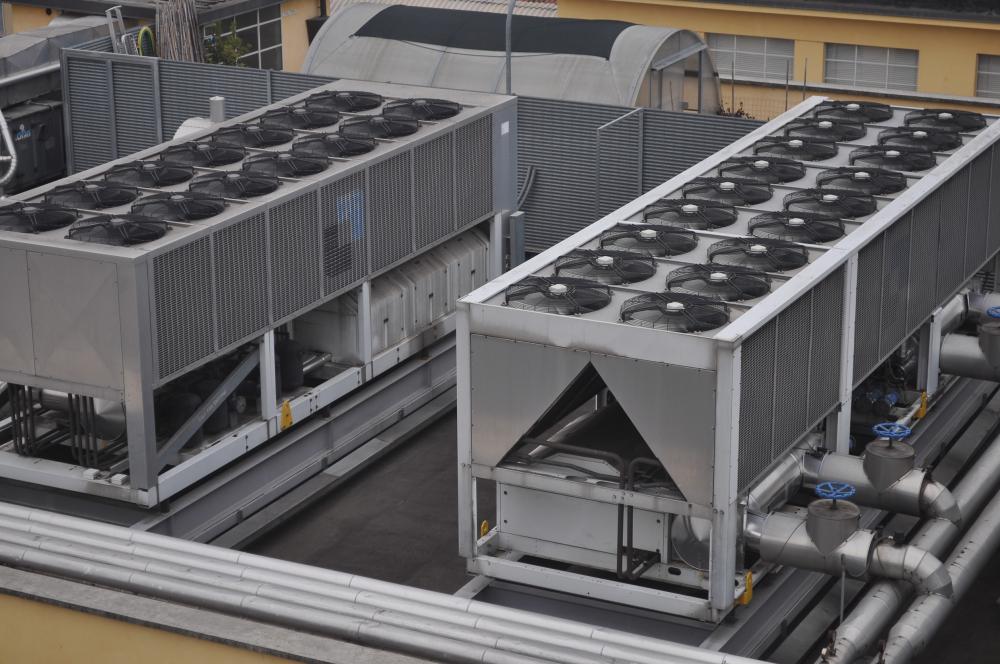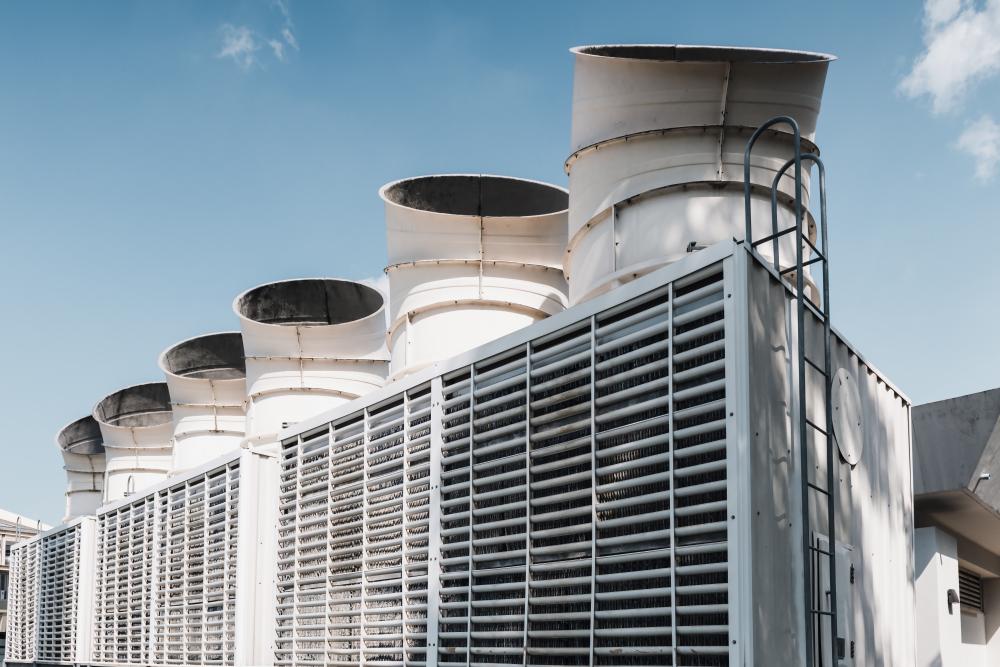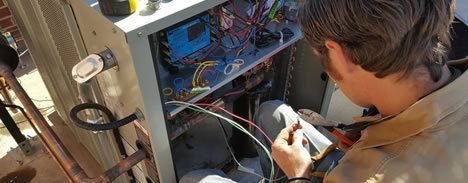
Service for HVAC Chillers
At B.I.M.S., Inc., our mission extends beyond just offering services; it’s about sharing knowledge that empowers our clients and the community around us. With over 45 years of experience, we’ve come to appreciate the intricacies of Chillers HVAC systems – essential components in commercial and industrial HVAC-R services. Let’s dive into the world of Chillers within the HVAC realm, breaking down complex concepts into understandable insights.
How Chillers Work
Understanding the Basics
Chillers HVAC systems play a pivotal role in providing climate control for a variety of spaces. Essentially, these systems work by removing heat from a space and discharging it elsewhere, utilizing a refrigeration cycle. There are two primary types of chillers: air-cooled and water-cooled. Each has unique benefits and applications, depending on the requirements of the space they serve.
Water-Cooled Chillers
In water-cooled chillers, water is the medium that carries heat away from the interior spaces. These chillers are highly efficient and are commonly used in large commercial spaces where there’s access to an ample water supply. The process involves an evaporator, compressor, condenser, and an expansion valve to cool the water, which in turn cools the air.
Air-Cooled Chillers
Air-cooled chillers, on the other hand, utilize air to remove heat. These systems are often more suitable for smaller or medium-sized installations where water availability is limited. They involve a similar refrigeration cycle but rely on fans to dissipate heat into the atmosphere.
Applications of Chillers
Chillers HVAC systems find applications in a diverse range of settings. Due to their efficiency in heat removal, they are particularly beneficial in places that generate a significant amount of heat, such as industrial settings or medical facilities. In addition to maintaining comfortable temperatures in commercial buildings, chillers are critical in processes that require specific temperature controls, like in the pharmaceutical industry or in data centers.
Choosing the Right Chiller
Evaluating Your Needs
Selecting the appropriate Chillers HVAC system entails a thorough evaluation of your requirements. Factors such as the size of the space, availability of water, and specific temperature needs play crucial roles in this decision-making process. It’s not just about cooling efficiency; it’s also about finding a system that aligns with your environmental and operational goals.
Expert Consultation
At B.I.M.S., Inc., we offer personalized consultations to help you navigate these choices. Our team of experts leverages their deep industry knowledge to provide recommendations tailored to your unique circumstances.
Maintenance of Chillers
Keeping Chillers at Peak Performance
Regular maintenance is key to ensuring the longevity and efficiency of Chillers HVAC systems. This includes routine inspections, cleaning of components, and prompt repairs. Neglect can lead to decreased efficiency, higher operational costs, and even premature system failure.
Personal Insights from the Field
Having worked on numerous Chillers HVAC systems, I’ve seen firsthand the difference that regular maintenance can make. A well-maintained chiller not only performs better but also saves on energy costs in the long run. One notable experience involved resurrecting a chiller that was neglected for years. Post-maintenance, the improvement in its performance was akin to turning night into day.
Common Problems and Solutions
Even with diligent maintenance, Chillers HVAC systems can encounter issues. Corrosion, compressor problems, and electrical failures are among the common challenges. However, with an experienced team like B.I.M.S., Inc., these issues can be promptly diagnosed and resolved. Our approach involves a detailed assessment to pinpoint the exact cause, followed by precise actions to rectify the problem.
Innovative Solutions in Chillers
Embracing innovations is part of our ethos at B.I.M.S., Inc. We’re continuously exploring new technologies and methods to enhance the efficiency and sustainability of Chillers HVAC systems. From incorporating energy-efficient components to adopting green refrigerants, we are committed to pushing the boundaries of what’s possible.
Why Choose B.I.M.S. for Chillers HVAC
Choosing B.I.M.S., Inc. means partnering with a team that brings unparalleled expertise and a commitment to excellence in Chillers HVAC. Our comprehensive range of services, from installation to maintenance, and our dedication to finding the best solutions tailored to your needs set us apart. With our knowledgeable team, fully-stocked trucks, and dedication to integrity, we ensure that your Chillers HVAC systems are in capable hands.
- Unmatched Expertise in Chillers HVAC
- Personalized Solutions and Consultations
- Commitment to Innovation and Sustainability
- Comprehensive Maintenance and Support Services
- A Trusted Partner in Commercial & Industrial HVAC-R Services
Chillers HVAC systems are vital to a wide range of applications, offering efficient cooling solutions tailored to specific requirements. At B.I.M.S., Inc., we’re here to ensure that your chillers are not just functional but optimized for peak performance and sustainability. Whether you’re exploring options for a new installation or seeking to enhance the efficiency of an existing system, our team is ready to bring our expertise to your service.

What is a chiller in HVAC?
At B.I.M.S., Inc., we often demystify the role of a chiller in HVAC systems for our clients. Simply put, a chiller is a key component in HVAC systems that removes heat from a liquid via a vapor-compression or absorption refrigeration cycle. This cooled liquid can then be circulated through a heat exchanger to cool equipment, or another process stream, such as air or process water. Chillers play a critical role in providing comfortable environments in commercial buildings, and efficient processes in industrial settings. It’s fascinating to see the transformation in environments, from unbearably hot to comfortably cool, all thanks to the magic of chillers.
What is the difference between HVAC chiller and process chiller?
In our day-to-day at B.I.M.S., Inc., we navigate the nuances between HVAC chillers and process chillers. HVAC chillers are primarily used to cool buildings and spaces, focusing on comfort for occupants. Process chillers, on the other hand, are tailored for industrial and manufacturing processes, concentrating on cooling machines, products, or substances. While both types operate on similar principles, the key difference lies in their application. Understanding this helps our clients make informed decisions about the type of chiller system that best suits their needs, whether they’re aiming to keep people comfortable or ensure the integrity of manufacturing processes.
What is a chiller vs air conditioner?
This is a common question we encounter at B.I.M.S., Inc. While both chillers and air conditioners serve the primary purpose of cooling, their applications, scale, and mechanisms differ. An air conditioner directly cools indoor air using a refrigeration cycle, making it ideal for residential and small commercial spaces. A chiller, however, cools water or another fluid, which is then used to cool air or equipment. This difference makes chillers a more versatile solution for large commercial buildings or industrial applications where direct air cooling is impractical or insufficient. Sharing this insight often helps our clients appreciate the scale and potential applications of chillers versus traditional air conditioners.
What are the types of chiller?
Understanding the types of chillers is crucial for selecting the most efficient and suitable system. In our practice at B.I.M.S., Inc., we broadly classify chillers into two categories: air-cooled and water-cooled. Air-cooled chillers rely on ambient air to remove heat from the refrigeration system, making them best for areas with limited water resources. Water-cooled chillers, however, use water to achieve the cooling effect, and while they are typically more efficient than air-cooled systems, they require access to a continuous water supply. By explaining these differences, we help our clients choose the right chiller type, ensuring they meet their environmental and operational goals with the most efficient and sustainable option.
How should one go about evaluating chillers for specific requirements?
Choosing the right chiller is more than just picking a type; it’s about understanding your specific requirements. At B.I.M.S., Inc., we advise clients to consider several factors: the size of the space, the availability of water (for water-cooled chillers), and specific temperature requirements. We also discuss the importance of energy efficiency, operational costs, and environmental impact. For instance, a client looking to equip a large commercial building would likely benefit from a water-cooled chiller, assuming water availability is not an issue. We pride ourselves on helping clients navigate these considerations, ensuring they find a chiller that aligns with their needs and values.
What are some innovative trends in chiller technology?
At B.I.M.S., Inc., we’re always excited about innovations that push the boundaries of what’s possible in chiller technology. Lately, we’ve seen a surge in the adoption of energy-efficient components and the use of green refrigerants. These advancements not only enhance the sustainability of chiller systems but also significantly reduce operational costs over time. For example, magnetic bearing compressors in chillers eliminate the need for oil, reducing maintenance requirements and increasing efficiency. Sharing these trends with our clients not only showcases our commitment to innovation but also helps them make decisions that contribute to a more sustainable future.
Have any questions about chillers or looking to explore how these systems can be optimized for your needs? Feel free to leave your comments or get in touch with us directly. Your optimal cooling solution is just a conversation away.
Resources
- U.S. Environmental Protection Agency – Ozone Layer Protection: Explore information on the protection of the ozone layer, which is essential in regulating the use of refrigerants in systems like chillers.
- U.S. Department of Energy: Access resources on energy efficiency, including tips on optimizing the performance of HVAC systems like chillers.
- American Society of Heating, Refrigerating and Air-Conditioning Engineers (ASHRAE): ASHRAE offers industry standards and guidelines for the design, operation, and maintenance of HVAC systems, including chillers.
- ENERGY STAR: Learn about energy-efficient products and practices to reduce energy consumption, including options for chillers that meet ENERGY STAR criteria.



